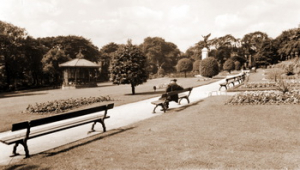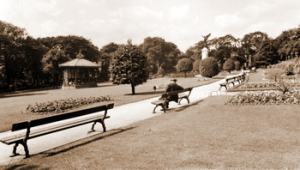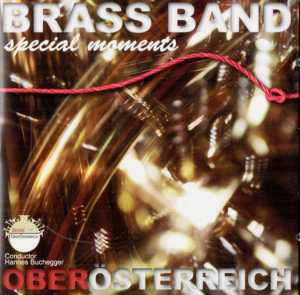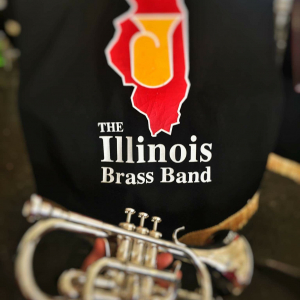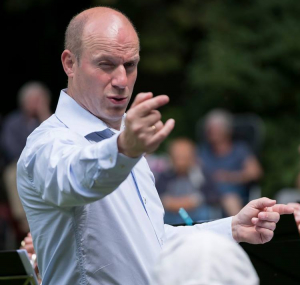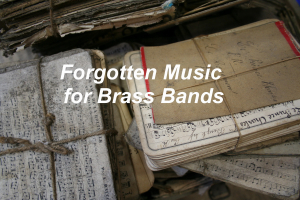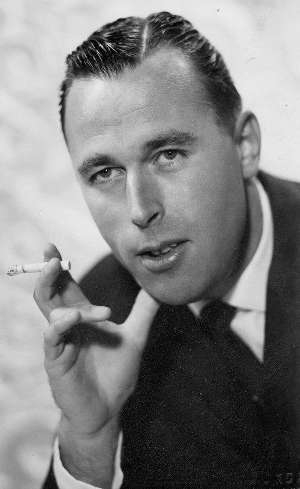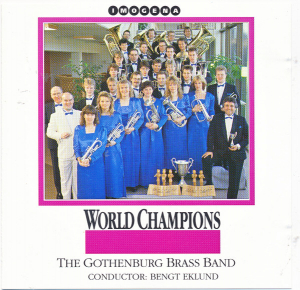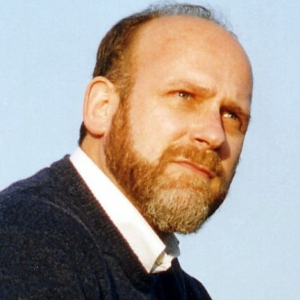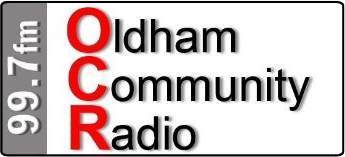
Chris Helme
On this show we feature the Austrian vocalist Regina Mallinger (stage name Ina Regen). She was born September 29, 1984, in Upper Austria. She is an Austrian singer-songwriter. After graduating from high school, she studied jazz and popular singing at the Anton Bruckner Private University in Linz, graduating with honours in 2008.
She received further instruction in pop and musical voice training from Sascha Wienhausen and in acting from Kristian Nekrasov. From 2009 she taught at the Upper Austrian State Music School, from 2012 singing at the Music School in Vöcklabruck. In addition, in 2003 she began studying social economics at the University of Linz .
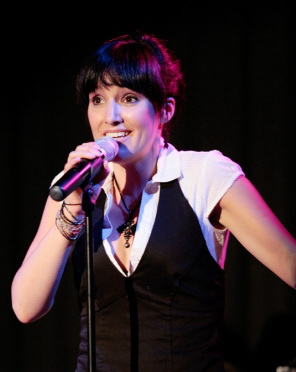
In 2010 she featured on two tracks with the Brass Band Obersterrich on their CD 'Special Moments'. We are featuring her performance of Stephen Schwartz 'Defying Gravity' from the musical 'Wicked' on this show.
Dedicated to bringing British - style brass band music to audiences in Chicago and across the Midwest, George Foster and William Holmer founded The Illinois Brass Band in February of 1991 with assistance from Boosey and Hawkes. The band is composed of 30 volunteer musicians and is the most senior of Illinois' brass bands.
As a member of the North American Brass Band Association (NABBA), The band attended its first competition in 1993. It was awarded first place in NABBA's Honours Division in 1994 and followed with an unprecedented string of six championships in seven years (1996- 2002) in the Championship Division.
The band also represented NABBA at the Great American Brass Band Festival in 1999 and was honoured to attend the 2003 British Open Brass Band Championships - the first brass band outside the British Commonwealth to compete in this prestigious event.
The band has released several recordings: A Christmas Fantasy; Championship Brass; Shakin'...not Stirred; Live and Kickin; Hark!; and most recently Cookin' with brass. It has also showcased exceptional guest soloists, including internationally renowned euphonium virtuosi Robert and David Childs, cornet soloist Roger Webster, trombone soloist Brett Baker, euphonium soloist David Thornton, and tenor horn soloist Paul Bennett.
The band has astonished audiences with the power, virtuosity, and beauty of the British style brass band and breadth of its repertoire. Through performances, recordings, and participation in competitions and festivals, it continues to bring the excitement of brass band music to general audiences and brass aficionados alike.
Percy Aldridge Grainger (born George Percy Grainger: 8 July 1882 – 20 February 1961 was an Australian-born composer, arranger and pianist who lived in the United States from 1914 and became an American citizen in 1918.
In the course of a long and innovative career he played a prominent role in the revival of interest in British folk music in the early years of the 20th century. Although much of his work was experimental and unusual, the piece with which he is most generally associated is his piano arrangement of the folk-dance tune ‘Country Gardens.
After fulfilling a hectic schedule of concert engagements in Britain and continental Europe, in August 1908 Grainger accompanied Ada Crossley on a second Australasian tour, during which he added several cylinders of Maori and Polynesian music to his collection of recordings.
He had resolved to establish himself as a top-ranking pianist before promoting himself as a composer, though he continued to compose both original works and folk-song settings. Some of his most successful and most characteristic pieces, such as ‘Mock Morris’ ‘Handel in the Strand’, ‘Shepherd's Hey’ and ‘’ date from this period.
On this week’s show the first half is centred on Light Music and ‘Shepherd Hey’ is on our programme.
Bart Van Neyghem (b:1965) studied with tuba teacher G. De Volder at the KMC in Ghent and won several first prizes. In addition, as an instrumentist (tuba) he obtained the soloist diploma with the greatest distinction at the 'Hochschule für Musik' in Cologne and he also obtained the higher diploma in chamber music at the 'Conservatoire Royal de Musique' in Brussels with the greatest distinction.
Bart is an enthusiastic and passionate educator : he taught at the KMC in Ghent and at the KMC Bruxelles and is now a teacher at the academy in Anderlecht.
His great passion is conducting. He studied at the KMC in Brussels with Mr. Norbert Nozy, (formerly commander-kapellmeister of the Gidsen) and he obtained his first prize for wind band conducting.
As a performing musician, Bart was soloist bass tuba with the Groot Harmonie orchestra of the Gidsen for many years. He also has a lot of symphonic experience and has worked as a freelance musician for music ensembles such as the Koninklijke Muntschouwburg, the Antwerp Philharmonic, the Liège Philharmonic Orchestra and the WDR Bigband, among others.
Within the brass band world itself, Bart played for a long time with the renowned Brass Band Willebroek; they have already won the title of European champion three times.
In the 1990s, he toyed with the idea of establishing a brass band in Lennik, which is a Belgian province of Flemish Brabant. For this he departed from the brass ensemble Bacchus, which had existed for quite some time. Supplementing this ensemble with better musicians nationwide, in February 1998 Brassband Bacchus was ready for the public.
In 1998, the press presentation followed with a concert and although brass bands were new in Lennik, it was now on the map. The band strives to create as much joy as possible from making music itself and setting high standards.
With conductor Bart van Neyghem at the helm, Brassband Bacchus has taken part in competitions both af home and abroad, being placed at many of these events. The band reached a new peak by winning the world title in the first division at the WMC in Kerkrade.
We feature the band with MD: Bart van Neyghem on this week's show with a contest performance in 2005.
Cyril Jenkins, born in Swansea on October 9, 1889, was 88 when he died at Hove on March 15, 1978. He is associated with the brass band world, no fewer than four of his major works having been test pieces: Coriolanus at the National (1920), Life Divine (National 1921), Victory - National, (1929) and Saga of the North (Open, 1965).
Life Divine remains popular even to this day, Coriolanus is not often played and the remaining two hardly ever. They were among the first major original works to be commissioned for the brass band movement's major championships. They earned criticism at the time for being of technical, rather than musical, interest - but the fact that they are still occasionally programmed in concerts (up to 40 years ago) answered some of that criticism. Coriolanus has not been a set test contest piece since 1992 and whilst as an own choice it did well for many years, it has only been chosen four times since 1994.
The story goes he originally titled Life Divine for A Comedy of Errors. However, that title was almost rejected by Herbert Whiteley, who was the editor of the British Bandsman (1906–1930) and had long worked to get serious composers to write for brass bands.
Whitley thought the title was frivolous and somewhat inappropriate to the participating bands in the competition - who had their full share of playing the demanding work... Jenkins agreed to change the title of the work to something more appropriate (at least in Whiteley's opinion) Life Divine . A good title that matches the tone poem's dignity, many would probably say!
In the 1920 contest at the Crystal Palace the winning band was St Hilda Colliery Band MD: William Halliwell. In second place was Lincoln Iron Works MD: William Halliwell and in 3rd place was Irwell Springs MD: J.A.Greenwood.
We are featuring a massed bands performance of Coriolanus in 1990 with Harry Mortimer conducting. This is a contest piece that you don't often here these days and is one brass band's pieces of forgotten music.
Jack Trombey aka Jan Stoeckart (3.November 1927 – 1 March.2017) a Dutch composer, conductor, trombonist and radio producer, who often worked under various pseudonyms such as Willy Faust, Peter Milray, Julius Steffaro and Jack Trombey.
In the UK he is best known for Eye Level, the theme tune to the ITV series Van der Valk, which was number one on the UK singles chart in 1973. He also composed "Homeward Bound", a theme from the film Monty Python and the Holy Grail (1975), under the pseudonym Jack Trombey. He took piano and trombone lessons from the age of 12. After Graduating in 1950 he began his career as a professional musician (trombone and double bass) and conducting.
In 1974, he become a freelance composer, working as a music producer for various radio shows, with which he popularised brass and choral music. He also continued to compose and arrange music for Dutch films and for brass bands. He composed approximately 1200-1300 works.
He died on 13.01. 2017, in Hilversum, at the age of 89.
On this week's show we are playing Eye Level with the Hendon Band conductied by Don Morrison.
Bengt Eklund was Professor of Trumpet, Chamber Music and Instrumental Methods at the Academy of Music and Drama in Gothenburg and Professor of Trumpet at the Norwegian Academy of Music in Oslo. He held trumpet positions in Gävle Symphony Orchestra, Aarhus Symphony Orchestra and Gothenburg Symphony Orchestra and was considered one of the foremost pedagogues in Scandinavia and throughout the world’s trumpet community.
Many of his former students went on to occupy positions in professional ensembles throughout the world. In 2006 he received the prestigious ‘International Trumpet Guild Award of Merit’ as an acknowledgement of his work and of everything he did for the trumpet community over the years.
He founded Gothenburg Brass Band in 1982 with the intention to bring the culture of brass band to new, exciting places. The band quickly gained an international reputation, participating in orchestral festivals and contests throughout the world. Through continuous work he created respect for this ensemble form within the tradition-bound world of classical and orchestral music.
Within five years of its existence the band won the title of 1988 World Champion Band while on tour in Australia. The band held the position of Swedish Champions for many years and won the New Zealand Championship in 2005.
Through their many tours (more than 35!) of countries such as France, Russia, Japan and the USA, He helped spread brass band music to audiences everywhere. His insight into the musical potential of the band and his students provided the perfect training for young players throughout the 25 years of the band’s existence.
Sadly, he was diagnosed with a serious form of cancer in early 2006. Through his enormous willpower he still managed to conduct in most of the band’s concerts, leaving lasting memories to those involved in the band and to the attending audiences.
In his lifetime he touched the hearts of many through his intuitive teaching methods and his committed spirit. He inspired all the young musicians he came in contact with, a great leader and friend to many.
Following his death, the band decided not to continue, and in 2007 the Gothenburg Brass Band was disbanded.
On this week’s show we are featuring the band and with Professor Eklund in a performance from their World Champion CD.
Michael Ball was born in Manchester in 1946. As a Ralph Vaughan Williams Trust Scholar at the Royal College of Music, he studied with Herbert Howells, Humphrey Searle and John Lambert. In 1970 he was one of four students selected to take part in master classes with Nadia Boulanger on her visit to the RCM and in the same year was awarded all the major composition prizes of the College, including the Octavia Travelling Scholarship, which he used to study with Franco Donatoni in Italy during the summers of 1972 and 1973. Whilst he was there, he participated in master classes with Luciano Berio and György Ligeti.
Michael is active within all main areas of composition and his music is regularly played and broadcast, particularly in the United Kingdom and increasingly, world-wide. He has received many commissions, including five from the BBC over the last ten years, and has written several large-scale works for orchestra. Both Resurrection Symphonies (1982) and Danses vitales: Danses macabres (1987) were first performed by the BBC Philharmonic Orchestra, conducted by Edward Downes. Following Omaggio, commissioned by Timothy Reynish for the Royal Northern College of Music Wind Orchestra in 1986, his recent writing for wind and brass number Chaucer's Tunes (premièred at the 1993 BASBWE Conference by Stockport School Wind Band), Frontier! (1984), selected as test-piece for the 1987 European Brass Band Championships and again for the regional finals of the Championship Section of the National Brass Band Championships in 1992 and Midsummer Music, commissioned by Paul Hindmarsh for Besses o'th'Barn Band in 1991. Whitsun Wakes, was commissioned by the BBC and first performed by the Black Dyke Band, conductor James Watson at the Bridgewater Hall in Manchester on 26 May 1997, as part of the BBC 'Music Live!' Festival. It was subsequently selected as test-piece for the 1997 British Open Brass Band Championship.
Important choral works by this composer include Sainte Marye Virgine (1979), A Hymne to God my God (1984) for sixteen solo voices, commissioned by the BBC for the BBC Northern Singers' 30th anniversary, and Nocturns (1990) for mixed choir, two pianos and percussion. A number of smaller choral pieces for both the church and the concert hall are also to be found in his choral catalogue
Michael has also written several pieces for younger musicians, including his opera The Belly Bag, to a libretto by Alan Garner.
Michael Ball lives in Ireland.
On this week's show we are featuring his Cambrian Suite played by the Back Dyke Band conducted by Nicholas Childs in 2002.
Talks Available
All the presentations are timed to last up to an hour except where shown - questions are gladly taken after the presentation. All have been presented to male, female and mixed audiences of varying age groups.
-
A Postcard from the Past
The Sunny Vale Pleasure Gardens, Halifax - Yorkshire’s Alton Towers of the…
-
All in a Days Work
Reminiscences from 30 years in the Police Service – (humorous lecture presentation)…
-
Legends from the world of Brass Bands
(Info-tainment – digital slides & music) – 1 hour presentation.
-
A Week in May
A story based on the Murder of Lord Frederick Cavendish (of the…
- Memories of Christmas Past
-
The Road to Publication
In 1979 I was asked to assist in presenting a series of…
- Holiday Memories from the Past
-
How we used to live
We have all seen and experienced changes in our lives. Bring back…
-
Other Folks Rubbish (Not suited to a Zoom presentation)
With a local history theme… – (thought provoking humorous lecture presentation) –…
- So you want to be a Pirate ? - The life of a Pirate was not all that it seemed
- Superstitions, New Year Resolutions and the Origins of St Valentine's Day
- Brighouse at Work
-
Sorry but I am not able to accept any more face to face talk bookings at the present time ONLY ZOOM TALKS


